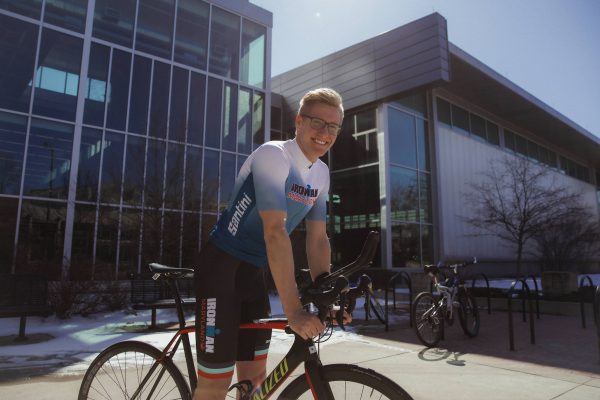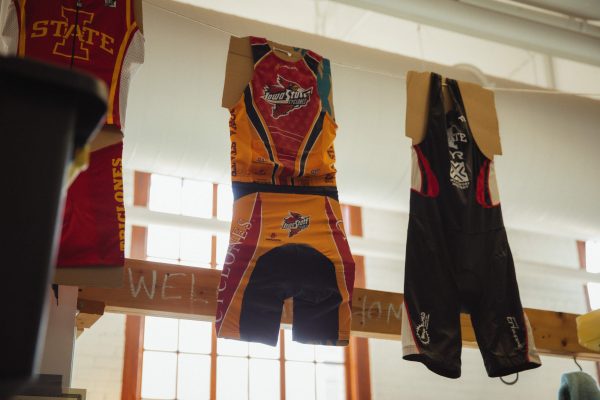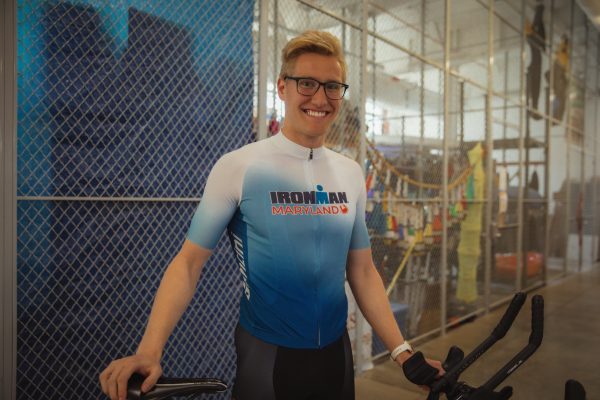
Reese Manternach (’23 statistics, economics) can’t stop smiling. Whether it’s his job as a physical therapy tech, his human anatomy class in Iowa State’s cadaver teaching lab, or his friends in ISU’s Triathlon Club, he loves talking about every step of his Cyclone experience.
That’s good, because it’s been a marathon.
Changing course
During his first year at Iowa State, Manternach chose to double major in statistics and economics, and added minors in computer science and music. Seeking even more challenges, he started searching for internships his freshman year, and through CyHire, he obtained a statistics internship with Collins Aerospace.
The summer internship went so well that he was hired back as a part-time quality engineer for the fall. While he enjoyed his duties and his colleagues, he wasn’t sure a desk job was the right fit for him.

Then during his sophomore year, Manternach, a high school swimmer who had done triathlons in the past, decided to try and complete an Ironman in under 12 hours. He was excited to learn Iowa State had a triathlon club and began training with other Cyclones.
“Everyone else on the club was doing something health-related,” Manternach said. “It was cool to hear what other people are studying, and I started realizing how important exercise was to me. I sat down with LAS Career Services to say, ‘Hey, I like exercising, I like helping people. What career options are available for me?’”
With support from advisors and faculty and lots of additional science credits, Manternach is now preparing for physical therapy school. His verdict after a year of anatomy, biology, and physiology classes?
“It’s been an absolute blast,” he said.
In fact, he just might be the only statistics and economics major to take classes in Iowa State’s human anatomy lab, which teaches human anatomy using cadavers donated for teaching purposes. It’s one of Manternach’s favorite science classes, thanks to the passion of Michael Lyons, teaching professor in the College of Veterinary Medicine’s Department of Biomedical Sciences.
“Looking back at it, a year ago today I never would have thought I’d be a in lab like that,” he said. “I absolutely love the professor, Dr. Lyons. He designed the class around helping students who want to go to graduate school in health programs manage the hard subjects they will experience in graduate school.”
Hands-on health experience

One of Manternach’s favorite experiences has been volunteering at physical therapy clinics, including a part-time job with McFarland Clinic where he can see classroom learning translated into real-world impact. He also completed observation hours at a neurorehabilitation center at the inpatient campus On with Life, located in Ankeny, Iowa.
“This was an eye-opening experience for me,” he said. “If you get into physical therapy, you can work in an outpatient or hospital setting. Either way, you’re going to see a variety of diagnoses from people of all backgrounds. Observing the variety of sports medicine and geriatrics patients last summer confirmed my interest in physical therapy and my willingness to help anyone get better.”
Strength in faculty mentors
Thanks to his diverse academic interests, Manternach has connected with great faculty mentors in every corner of campus. In one of his economics classes, Manternach’s question about unemployment rates and college towns elicited an enthusiastic invitation from University Professor Peter Orazem to conduct an undergraduate research project on the topic.
Manternach and Orazem are now in the process of writing a paper for publication, and Manternach is also part of an interdisciplinary team of students preparing for a case bank study competition with Orazem.
“Dr. Orazem is another one of those professors where he’s really great at research, but he’s also really into teaching,” Manternach said. “I just love the academics here.”
Manternach also recently initiated an independent research project that combines his passion for triathlons and biking with his interest in physiology. Working with Karri Haen, teaching professor in the Department of Genetics, Development, and Cell Biology, Manternach is examining whether performing glute activation movements prior to cycling could affect power output.
Manternach hopes his unique foundation in statistics, economics, and science will make him an even better health professional in the future, giving him skills to analyze data and perhaps even run his own practice one day – all with the goal of improving lives.
“I love working with other people and seeing them get better,” he said. “Not everyone has a linear path to recovery, and it looks different for everyone. To help somebody get back on their feet and to know you made a difference in their life – it’s a huge driving factor.”